Nigeria's Economic Development: Growth, Challenges and Priorities
VerifiedAdded on 2020/02/03
|11
|2787
|48
Report
AI Summary
This report provides an in-depth analysis of Nigeria's economic development, examining its recent growth, challenges, and future prospects. It begins with an introduction to Nigeria's economic standing in Africa and the world, highlighting its growth rate and key sectors like oil, agriculture, and entertainment. The report delves into the challenges faced by the Nigerian economy, including exchange rate volatility, falling oil prices, corruption, and lack of clarity in foreign policy. It then identifies three key areas for prioritization to foster economic growth: manufacturing, infrastructure, and social development. The report emphasizes the need to boost the manufacturing sector, improve infrastructure, and enhance social development through education and poverty eradication programs. By addressing these priorities, Nigeria can overcome its challenges and emerge as a leading economic power. This assignment, and many others, are available on Desklib, a platform offering AI-powered study tools and resources.
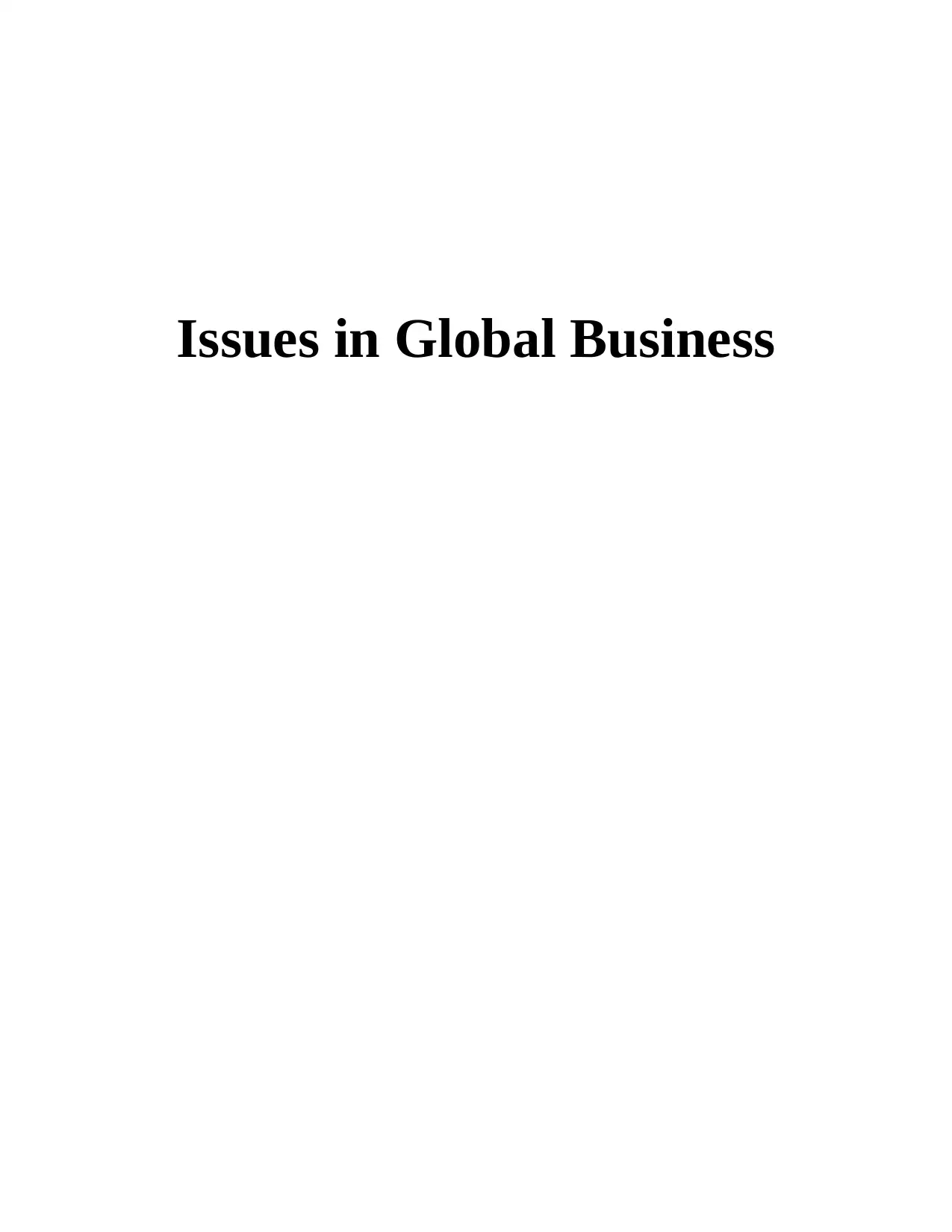
Issues in Global Business
Paraphrase This Document
Need a fresh take? Get an instant paraphrase of this document with our AI Paraphraser
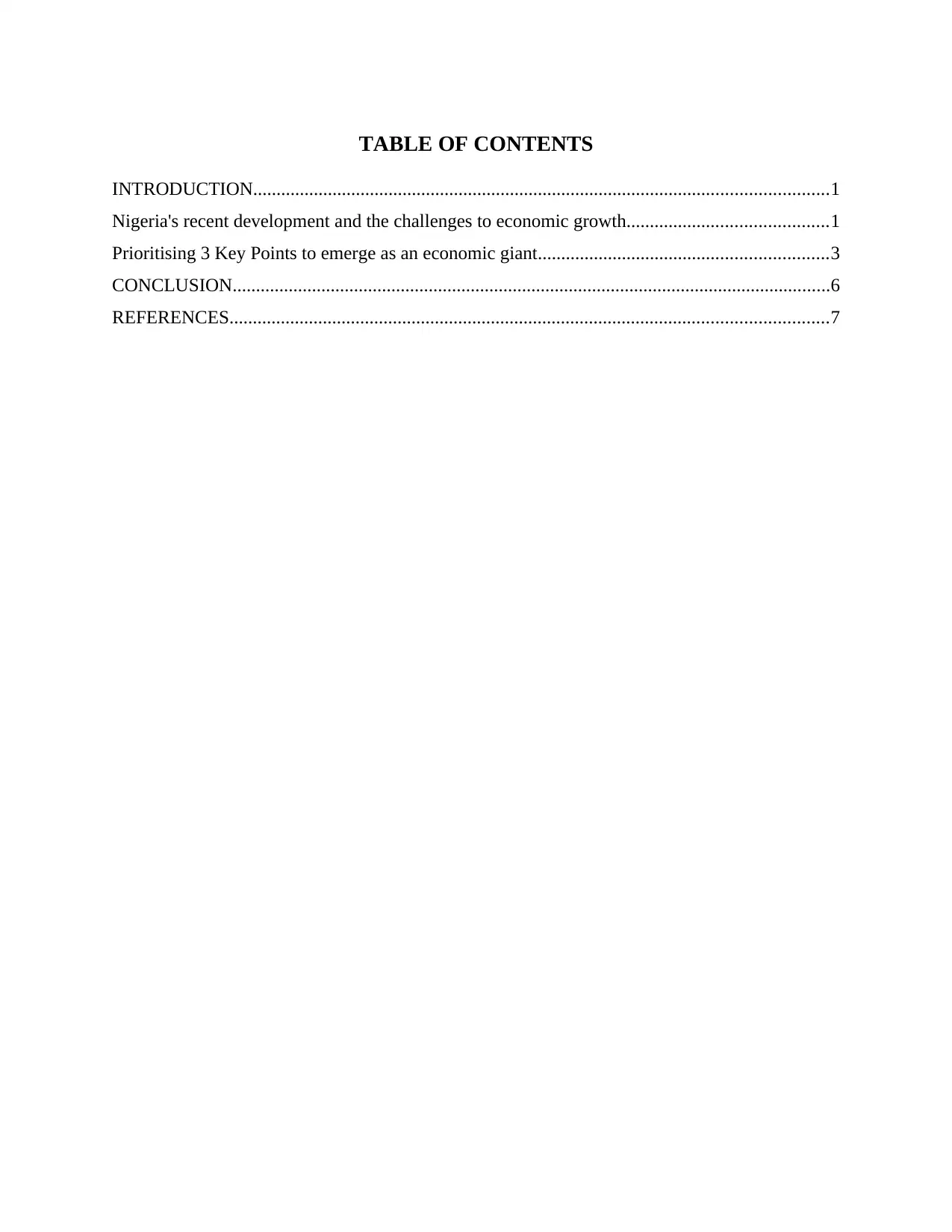
TABLE OF CONTENTS
INTRODUCTION...........................................................................................................................1
Nigeria's recent development and the challenges to economic growth...........................................1
Prioritising 3 Key Points to emerge as an economic giant..............................................................3
CONCLUSION................................................................................................................................6
REFERENCES................................................................................................................................7
INTRODUCTION...........................................................................................................................1
Nigeria's recent development and the challenges to economic growth...........................................1
Prioritising 3 Key Points to emerge as an economic giant..............................................................3
CONCLUSION................................................................................................................................6
REFERENCES................................................................................................................................7

⊘ This is a preview!⊘
Do you want full access?
Subscribe today to unlock all pages.

Trusted by 1+ million students worldwide
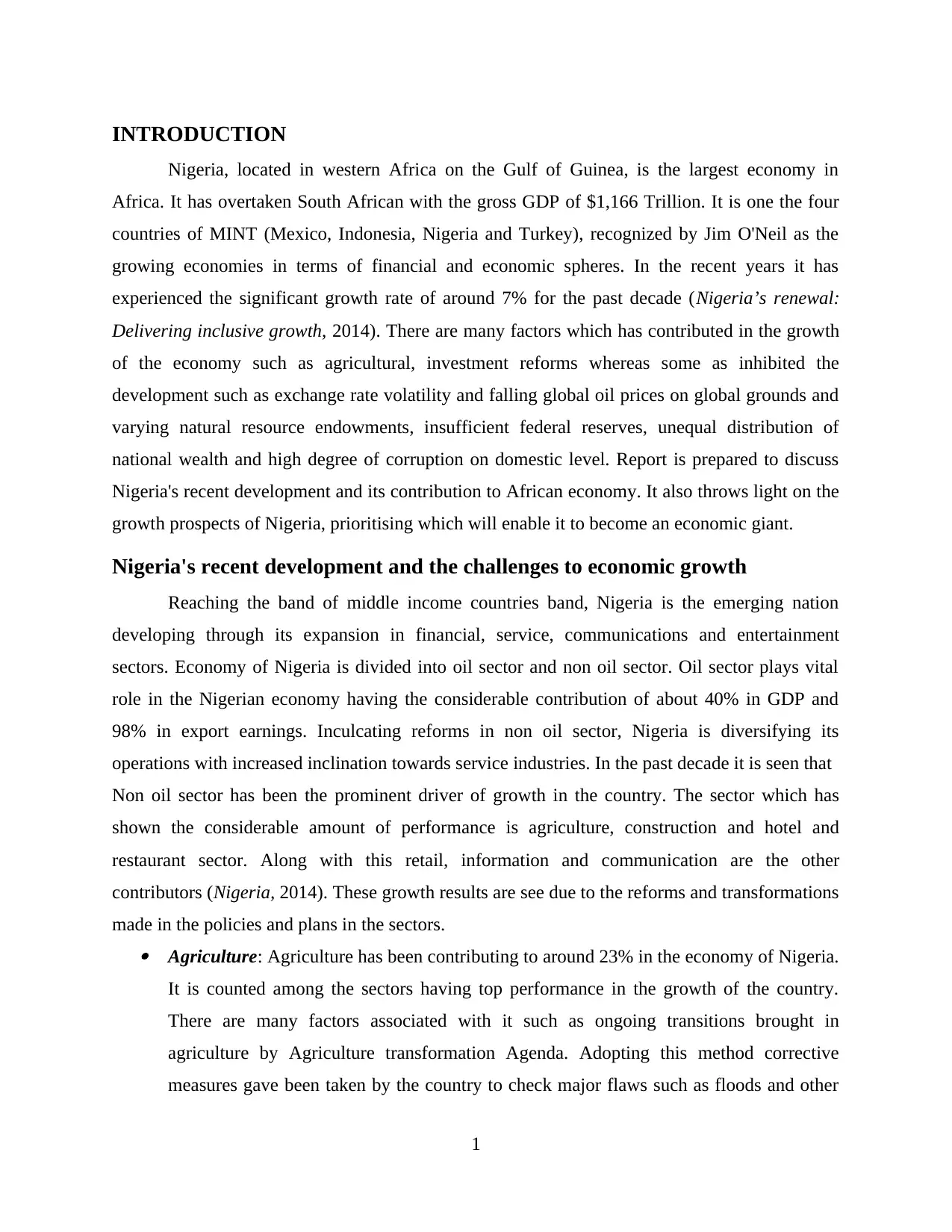
INTRODUCTION
Nigeria, located in western Africa on the Gulf of Guinea, is the largest economy in
Africa. It has overtaken South African with the gross GDP of $1,166 Trillion. It is one the four
countries of MINT (Mexico, Indonesia, Nigeria and Turkey), recognized by Jim O'Neil as the
growing economies in terms of financial and economic spheres. In the recent years it has
experienced the significant growth rate of around 7% for the past decade (Nigeria’s renewal:
Delivering inclusive growth, 2014). There are many factors which has contributed in the growth
of the economy such as agricultural, investment reforms whereas some as inhibited the
development such as exchange rate volatility and falling global oil prices on global grounds and
varying natural resource endowments, insufficient federal reserves, unequal distribution of
national wealth and high degree of corruption on domestic level. Report is prepared to discuss
Nigeria's recent development and its contribution to African economy. It also throws light on the
growth prospects of Nigeria, prioritising which will enable it to become an economic giant.
Nigeria's recent development and the challenges to economic growth
Reaching the band of middle income countries band, Nigeria is the emerging nation
developing through its expansion in financial, service, communications and entertainment
sectors. Economy of Nigeria is divided into oil sector and non oil sector. Oil sector plays vital
role in the Nigerian economy having the considerable contribution of about 40% in GDP and
98% in export earnings. Inculcating reforms in non oil sector, Nigeria is diversifying its
operations with increased inclination towards service industries. In the past decade it is seen that
Non oil sector has been the prominent driver of growth in the country. The sector which has
shown the considerable amount of performance is agriculture, construction and hotel and
restaurant sector. Along with this retail, information and communication are the other
contributors (Nigeria, 2014). These growth results are see due to the reforms and transformations
made in the policies and plans in the sectors. Agriculture: Agriculture has been contributing to around 23% in the economy of Nigeria.
It is counted among the sectors having top performance in the growth of the country.
There are many factors associated with it such as ongoing transitions brought in
agriculture by Agriculture transformation Agenda. Adopting this method corrective
measures gave been taken by the country to check major flaws such as floods and other
1
Nigeria, located in western Africa on the Gulf of Guinea, is the largest economy in
Africa. It has overtaken South African with the gross GDP of $1,166 Trillion. It is one the four
countries of MINT (Mexico, Indonesia, Nigeria and Turkey), recognized by Jim O'Neil as the
growing economies in terms of financial and economic spheres. In the recent years it has
experienced the significant growth rate of around 7% for the past decade (Nigeria’s renewal:
Delivering inclusive growth, 2014). There are many factors which has contributed in the growth
of the economy such as agricultural, investment reforms whereas some as inhibited the
development such as exchange rate volatility and falling global oil prices on global grounds and
varying natural resource endowments, insufficient federal reserves, unequal distribution of
national wealth and high degree of corruption on domestic level. Report is prepared to discuss
Nigeria's recent development and its contribution to African economy. It also throws light on the
growth prospects of Nigeria, prioritising which will enable it to become an economic giant.
Nigeria's recent development and the challenges to economic growth
Reaching the band of middle income countries band, Nigeria is the emerging nation
developing through its expansion in financial, service, communications and entertainment
sectors. Economy of Nigeria is divided into oil sector and non oil sector. Oil sector plays vital
role in the Nigerian economy having the considerable contribution of about 40% in GDP and
98% in export earnings. Inculcating reforms in non oil sector, Nigeria is diversifying its
operations with increased inclination towards service industries. In the past decade it is seen that
Non oil sector has been the prominent driver of growth in the country. The sector which has
shown the considerable amount of performance is agriculture, construction and hotel and
restaurant sector. Along with this retail, information and communication are the other
contributors (Nigeria, 2014). These growth results are see due to the reforms and transformations
made in the policies and plans in the sectors. Agriculture: Agriculture has been contributing to around 23% in the economy of Nigeria.
It is counted among the sectors having top performance in the growth of the country.
There are many factors associated with it such as ongoing transitions brought in
agriculture by Agriculture transformation Agenda. Adopting this method corrective
measures gave been taken by the country to check major flaws such as floods and other
1
Paraphrase This Document
Need a fresh take? Get an instant paraphrase of this document with our AI Paraphraser
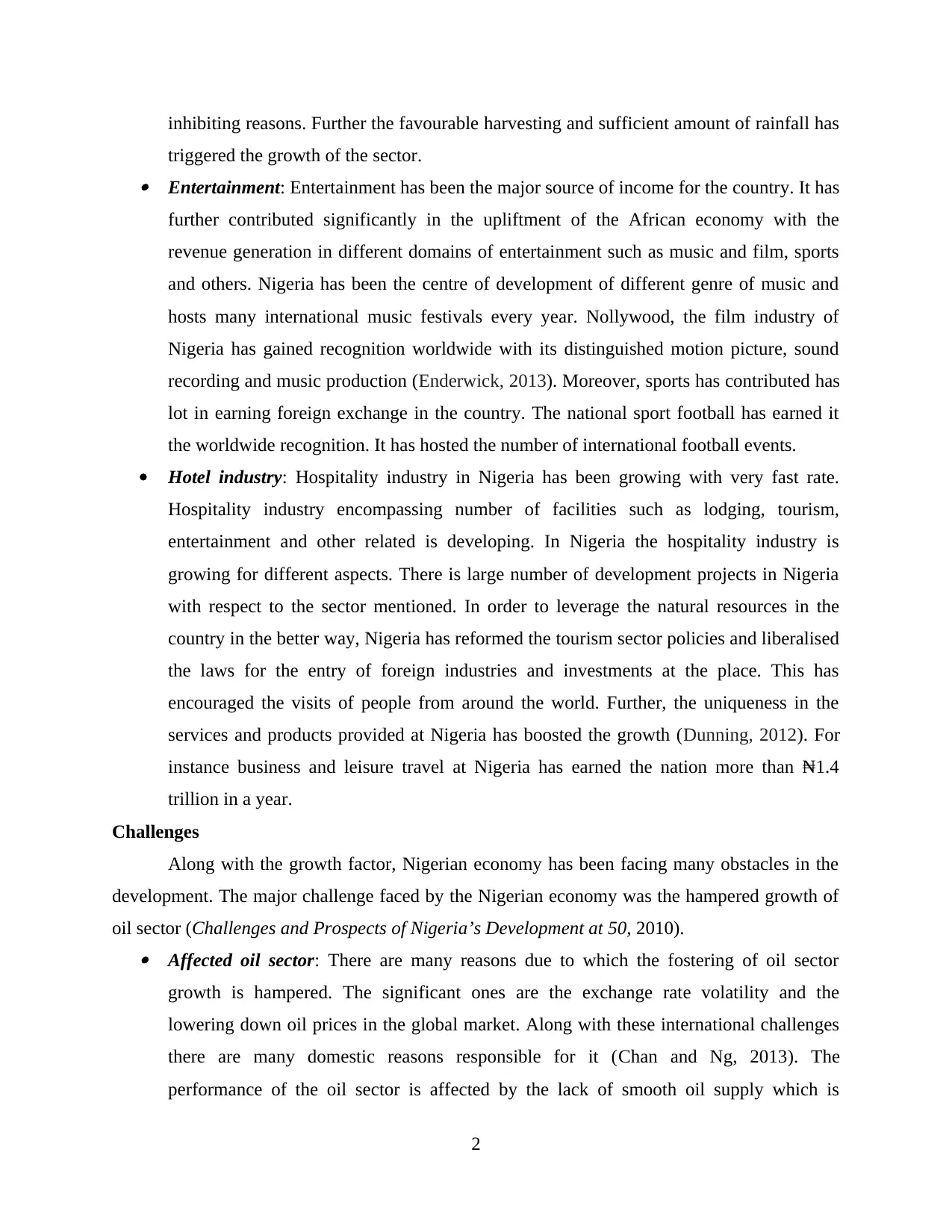
inhibiting reasons. Further the favourable harvesting and sufficient amount of rainfall has
triggered the growth of the sector. Entertainment: Entertainment has been the major source of income for the country. It has
further contributed significantly in the upliftment of the African economy with the
revenue generation in different domains of entertainment such as music and film, sports
and others. Nigeria has been the centre of development of different genre of music and
hosts many international music festivals every year. Nollywood, the film industry of
Nigeria has gained recognition worldwide with its distinguished motion picture, sound
recording and music production (Enderwick, 2013). Moreover, sports has contributed has
lot in earning foreign exchange in the country. The national sport football has earned it
the worldwide recognition. It has hosted the number of international football events.
Hotel industry: Hospitality industry in Nigeria has been growing with very fast rate.
Hospitality industry encompassing number of facilities such as lodging, tourism,
entertainment and other related is developing. In Nigeria the hospitality industry is
growing for different aspects. There is large number of development projects in Nigeria
with respect to the sector mentioned. In order to leverage the natural resources in the
country in the better way, Nigeria has reformed the tourism sector policies and liberalised
the laws for the entry of foreign industries and investments at the place. This has
encouraged the visits of people from around the world. Further, the uniqueness in the
services and products provided at Nigeria has boosted the growth (Dunning, 2012). For
instance business and leisure travel at Nigeria has earned the nation more than ₦1.4
trillion in a year.
Challenges
Along with the growth factor, Nigerian economy has been facing many obstacles in the
development. The major challenge faced by the Nigerian economy was the hampered growth of
oil sector (Challenges and Prospects of Nigeria’s Development at 50, 2010). Affected oil sector: There are many reasons due to which the fostering of oil sector
growth is hampered. The significant ones are the exchange rate volatility and the
lowering down oil prices in the global market. Along with these international challenges
there are many domestic reasons responsible for it (Chan and Ng, 2013). The
performance of the oil sector is affected by the lack of smooth oil supply which is
2
triggered the growth of the sector. Entertainment: Entertainment has been the major source of income for the country. It has
further contributed significantly in the upliftment of the African economy with the
revenue generation in different domains of entertainment such as music and film, sports
and others. Nigeria has been the centre of development of different genre of music and
hosts many international music festivals every year. Nollywood, the film industry of
Nigeria has gained recognition worldwide with its distinguished motion picture, sound
recording and music production (Enderwick, 2013). Moreover, sports has contributed has
lot in earning foreign exchange in the country. The national sport football has earned it
the worldwide recognition. It has hosted the number of international football events.
Hotel industry: Hospitality industry in Nigeria has been growing with very fast rate.
Hospitality industry encompassing number of facilities such as lodging, tourism,
entertainment and other related is developing. In Nigeria the hospitality industry is
growing for different aspects. There is large number of development projects in Nigeria
with respect to the sector mentioned. In order to leverage the natural resources in the
country in the better way, Nigeria has reformed the tourism sector policies and liberalised
the laws for the entry of foreign industries and investments at the place. This has
encouraged the visits of people from around the world. Further, the uniqueness in the
services and products provided at Nigeria has boosted the growth (Dunning, 2012). For
instance business and leisure travel at Nigeria has earned the nation more than ₦1.4
trillion in a year.
Challenges
Along with the growth factor, Nigerian economy has been facing many obstacles in the
development. The major challenge faced by the Nigerian economy was the hampered growth of
oil sector (Challenges and Prospects of Nigeria’s Development at 50, 2010). Affected oil sector: There are many reasons due to which the fostering of oil sector
growth is hampered. The significant ones are the exchange rate volatility and the
lowering down oil prices in the global market. Along with these international challenges
there are many domestic reasons responsible for it (Chan and Ng, 2013). The
performance of the oil sector is affected by the lack of smooth oil supply which is
2
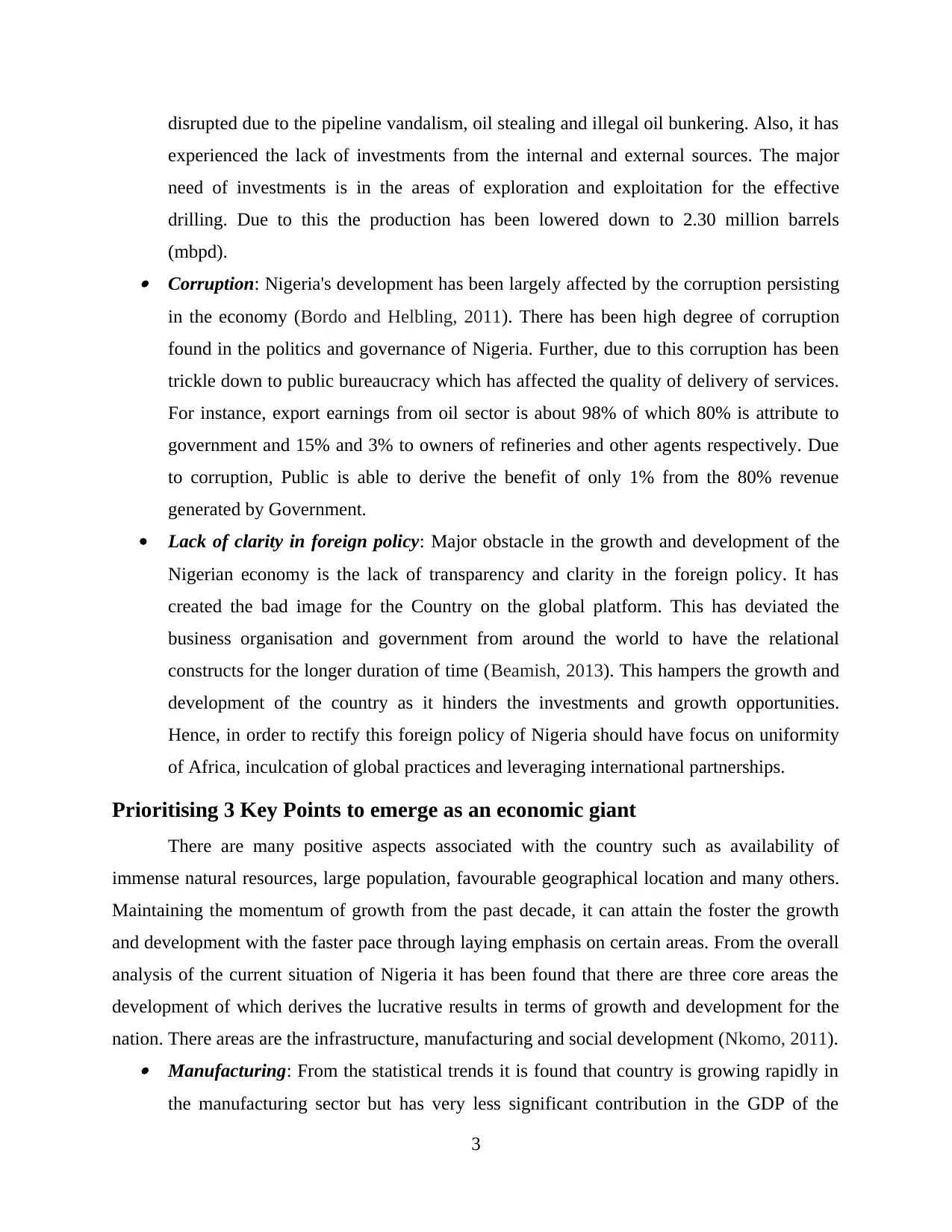
disrupted due to the pipeline vandalism, oil stealing and illegal oil bunkering. Also, it has
experienced the lack of investments from the internal and external sources. The major
need of investments is in the areas of exploration and exploitation for the effective
drilling. Due to this the production has been lowered down to 2.30 million barrels
(mbpd). Corruption: Nigeria's development has been largely affected by the corruption persisting
in the economy (Bordo and Helbling, 2011). There has been high degree of corruption
found in the politics and governance of Nigeria. Further, due to this corruption has been
trickle down to public bureaucracy which has affected the quality of delivery of services.
For instance, export earnings from oil sector is about 98% of which 80% is attribute to
government and 15% and 3% to owners of refineries and other agents respectively. Due
to corruption, Public is able to derive the benefit of only 1% from the 80% revenue
generated by Government.
Lack of clarity in foreign policy: Major obstacle in the growth and development of the
Nigerian economy is the lack of transparency and clarity in the foreign policy. It has
created the bad image for the Country on the global platform. This has deviated the
business organisation and government from around the world to have the relational
constructs for the longer duration of time (Beamish, 2013). This hampers the growth and
development of the country as it hinders the investments and growth opportunities.
Hence, in order to rectify this foreign policy of Nigeria should have focus on uniformity
of Africa, inculcation of global practices and leveraging international partnerships.
Prioritising 3 Key Points to emerge as an economic giant
There are many positive aspects associated with the country such as availability of
immense natural resources, large population, favourable geographical location and many others.
Maintaining the momentum of growth from the past decade, it can attain the foster the growth
and development with the faster pace through laying emphasis on certain areas. From the overall
analysis of the current situation of Nigeria it has been found that there are three core areas the
development of which derives the lucrative results in terms of growth and development for the
nation. There areas are the infrastructure, manufacturing and social development (Nkomo, 2011). Manufacturing: From the statistical trends it is found that country is growing rapidly in
the manufacturing sector but has very less significant contribution in the GDP of the
3
experienced the lack of investments from the internal and external sources. The major
need of investments is in the areas of exploration and exploitation for the effective
drilling. Due to this the production has been lowered down to 2.30 million barrels
(mbpd). Corruption: Nigeria's development has been largely affected by the corruption persisting
in the economy (Bordo and Helbling, 2011). There has been high degree of corruption
found in the politics and governance of Nigeria. Further, due to this corruption has been
trickle down to public bureaucracy which has affected the quality of delivery of services.
For instance, export earnings from oil sector is about 98% of which 80% is attribute to
government and 15% and 3% to owners of refineries and other agents respectively. Due
to corruption, Public is able to derive the benefit of only 1% from the 80% revenue
generated by Government.
Lack of clarity in foreign policy: Major obstacle in the growth and development of the
Nigerian economy is the lack of transparency and clarity in the foreign policy. It has
created the bad image for the Country on the global platform. This has deviated the
business organisation and government from around the world to have the relational
constructs for the longer duration of time (Beamish, 2013). This hampers the growth and
development of the country as it hinders the investments and growth opportunities.
Hence, in order to rectify this foreign policy of Nigeria should have focus on uniformity
of Africa, inculcation of global practices and leveraging international partnerships.
Prioritising 3 Key Points to emerge as an economic giant
There are many positive aspects associated with the country such as availability of
immense natural resources, large population, favourable geographical location and many others.
Maintaining the momentum of growth from the past decade, it can attain the foster the growth
and development with the faster pace through laying emphasis on certain areas. From the overall
analysis of the current situation of Nigeria it has been found that there are three core areas the
development of which derives the lucrative results in terms of growth and development for the
nation. There areas are the infrastructure, manufacturing and social development (Nkomo, 2011). Manufacturing: From the statistical trends it is found that country is growing rapidly in
the manufacturing sector but has very less significant contribution in the GDP of the
3
⊘ This is a preview!⊘
Do you want full access?
Subscribe today to unlock all pages.

Trusted by 1+ million students worldwide
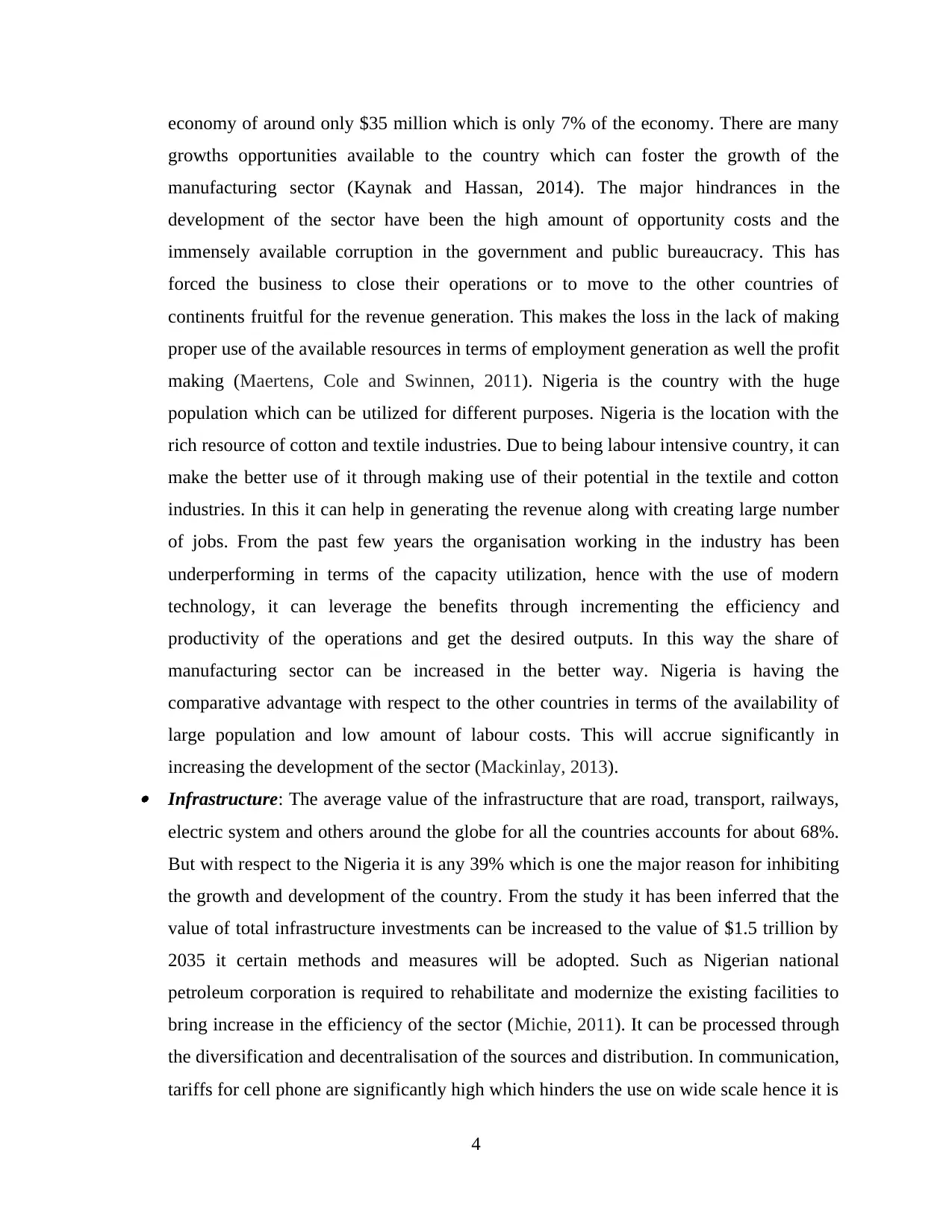
economy of around only $35 million which is only 7% of the economy. There are many
growths opportunities available to the country which can foster the growth of the
manufacturing sector (Kaynak and Hassan, 2014). The major hindrances in the
development of the sector have been the high amount of opportunity costs and the
immensely available corruption in the government and public bureaucracy. This has
forced the business to close their operations or to move to the other countries of
continents fruitful for the revenue generation. This makes the loss in the lack of making
proper use of the available resources in terms of employment generation as well the profit
making (Maertens, Cole and Swinnen, 2011). Nigeria is the country with the huge
population which can be utilized for different purposes. Nigeria is the location with the
rich resource of cotton and textile industries. Due to being labour intensive country, it can
make the better use of it through making use of their potential in the textile and cotton
industries. In this it can help in generating the revenue along with creating large number
of jobs. From the past few years the organisation working in the industry has been
underperforming in terms of the capacity utilization, hence with the use of modern
technology, it can leverage the benefits through incrementing the efficiency and
productivity of the operations and get the desired outputs. In this way the share of
manufacturing sector can be increased in the better way. Nigeria is having the
comparative advantage with respect to the other countries in terms of the availability of
large population and low amount of labour costs. This will accrue significantly in
increasing the development of the sector (Mackinlay, 2013). Infrastructure: The average value of the infrastructure that are road, transport, railways,
electric system and others around the globe for all the countries accounts for about 68%.
But with respect to the Nigeria it is any 39% which is one the major reason for inhibiting
the growth and development of the country. From the study it has been inferred that the
value of total infrastructure investments can be increased to the value of $1.5 trillion by
2035 it certain methods and measures will be adopted. Such as Nigerian national
petroleum corporation is required to rehabilitate and modernize the existing facilities to
bring increase in the efficiency of the sector (Michie, 2011). It can be processed through
the diversification and decentralisation of the sources and distribution. In communication,
tariffs for cell phone are significantly high which hinders the use on wide scale hence it is
4
growths opportunities available to the country which can foster the growth of the
manufacturing sector (Kaynak and Hassan, 2014). The major hindrances in the
development of the sector have been the high amount of opportunity costs and the
immensely available corruption in the government and public bureaucracy. This has
forced the business to close their operations or to move to the other countries of
continents fruitful for the revenue generation. This makes the loss in the lack of making
proper use of the available resources in terms of employment generation as well the profit
making (Maertens, Cole and Swinnen, 2011). Nigeria is the country with the huge
population which can be utilized for different purposes. Nigeria is the location with the
rich resource of cotton and textile industries. Due to being labour intensive country, it can
make the better use of it through making use of their potential in the textile and cotton
industries. In this it can help in generating the revenue along with creating large number
of jobs. From the past few years the organisation working in the industry has been
underperforming in terms of the capacity utilization, hence with the use of modern
technology, it can leverage the benefits through incrementing the efficiency and
productivity of the operations and get the desired outputs. In this way the share of
manufacturing sector can be increased in the better way. Nigeria is having the
comparative advantage with respect to the other countries in terms of the availability of
large population and low amount of labour costs. This will accrue significantly in
increasing the development of the sector (Mackinlay, 2013). Infrastructure: The average value of the infrastructure that are road, transport, railways,
electric system and others around the globe for all the countries accounts for about 68%.
But with respect to the Nigeria it is any 39% which is one the major reason for inhibiting
the growth and development of the country. From the study it has been inferred that the
value of total infrastructure investments can be increased to the value of $1.5 trillion by
2035 it certain methods and measures will be adopted. Such as Nigerian national
petroleum corporation is required to rehabilitate and modernize the existing facilities to
bring increase in the efficiency of the sector (Michie, 2011). It can be processed through
the diversification and decentralisation of the sources and distribution. In communication,
tariffs for cell phone are significantly high which hinders the use on wide scale hence it is
4
Paraphrase This Document
Need a fresh take? Get an instant paraphrase of this document with our AI Paraphraser
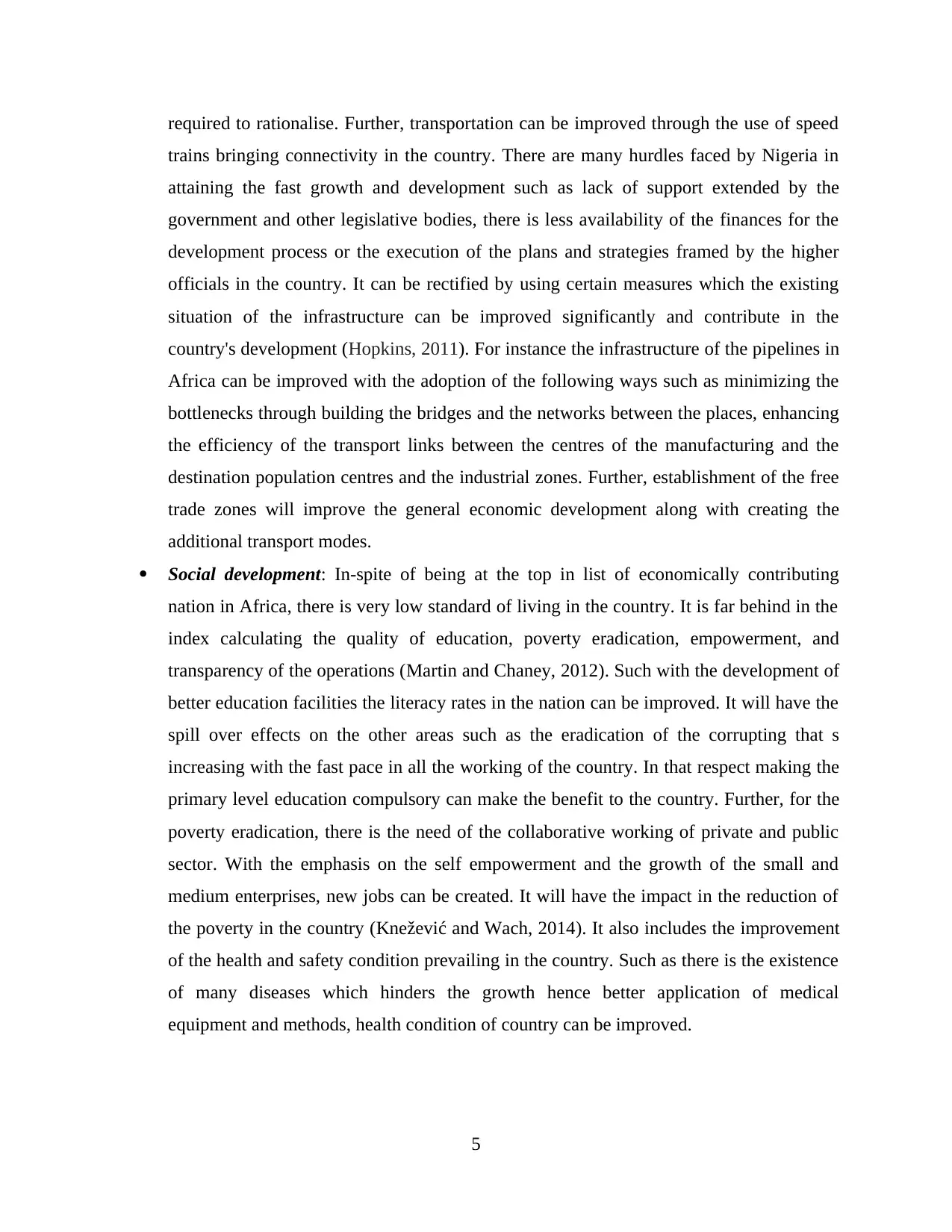
required to rationalise. Further, transportation can be improved through the use of speed
trains bringing connectivity in the country. There are many hurdles faced by Nigeria in
attaining the fast growth and development such as lack of support extended by the
government and other legislative bodies, there is less availability of the finances for the
development process or the execution of the plans and strategies framed by the higher
officials in the country. It can be rectified by using certain measures which the existing
situation of the infrastructure can be improved significantly and contribute in the
country's development (Hopkins, 2011). For instance the infrastructure of the pipelines in
Africa can be improved with the adoption of the following ways such as minimizing the
bottlenecks through building the bridges and the networks between the places, enhancing
the efficiency of the transport links between the centres of the manufacturing and the
destination population centres and the industrial zones. Further, establishment of the free
trade zones will improve the general economic development along with creating the
additional transport modes.
Social development: In-spite of being at the top in list of economically contributing
nation in Africa, there is very low standard of living in the country. It is far behind in the
index calculating the quality of education, poverty eradication, empowerment, and
transparency of the operations (Martin and Chaney, 2012). Such with the development of
better education facilities the literacy rates in the nation can be improved. It will have the
spill over effects on the other areas such as the eradication of the corrupting that s
increasing with the fast pace in all the working of the country. In that respect making the
primary level education compulsory can make the benefit to the country. Further, for the
poverty eradication, there is the need of the collaborative working of private and public
sector. With the emphasis on the self empowerment and the growth of the small and
medium enterprises, new jobs can be created. It will have the impact in the reduction of
the poverty in the country (Knežević and Wach, 2014). It also includes the improvement
of the health and safety condition prevailing in the country. Such as there is the existence
of many diseases which hinders the growth hence better application of medical
equipment and methods, health condition of country can be improved.
5
trains bringing connectivity in the country. There are many hurdles faced by Nigeria in
attaining the fast growth and development such as lack of support extended by the
government and other legislative bodies, there is less availability of the finances for the
development process or the execution of the plans and strategies framed by the higher
officials in the country. It can be rectified by using certain measures which the existing
situation of the infrastructure can be improved significantly and contribute in the
country's development (Hopkins, 2011). For instance the infrastructure of the pipelines in
Africa can be improved with the adoption of the following ways such as minimizing the
bottlenecks through building the bridges and the networks between the places, enhancing
the efficiency of the transport links between the centres of the manufacturing and the
destination population centres and the industrial zones. Further, establishment of the free
trade zones will improve the general economic development along with creating the
additional transport modes.
Social development: In-spite of being at the top in list of economically contributing
nation in Africa, there is very low standard of living in the country. It is far behind in the
index calculating the quality of education, poverty eradication, empowerment, and
transparency of the operations (Martin and Chaney, 2012). Such with the development of
better education facilities the literacy rates in the nation can be improved. It will have the
spill over effects on the other areas such as the eradication of the corrupting that s
increasing with the fast pace in all the working of the country. In that respect making the
primary level education compulsory can make the benefit to the country. Further, for the
poverty eradication, there is the need of the collaborative working of private and public
sector. With the emphasis on the self empowerment and the growth of the small and
medium enterprises, new jobs can be created. It will have the impact in the reduction of
the poverty in the country (Knežević and Wach, 2014). It also includes the improvement
of the health and safety condition prevailing in the country. Such as there is the existence
of many diseases which hinders the growth hence better application of medical
equipment and methods, health condition of country can be improved.
5
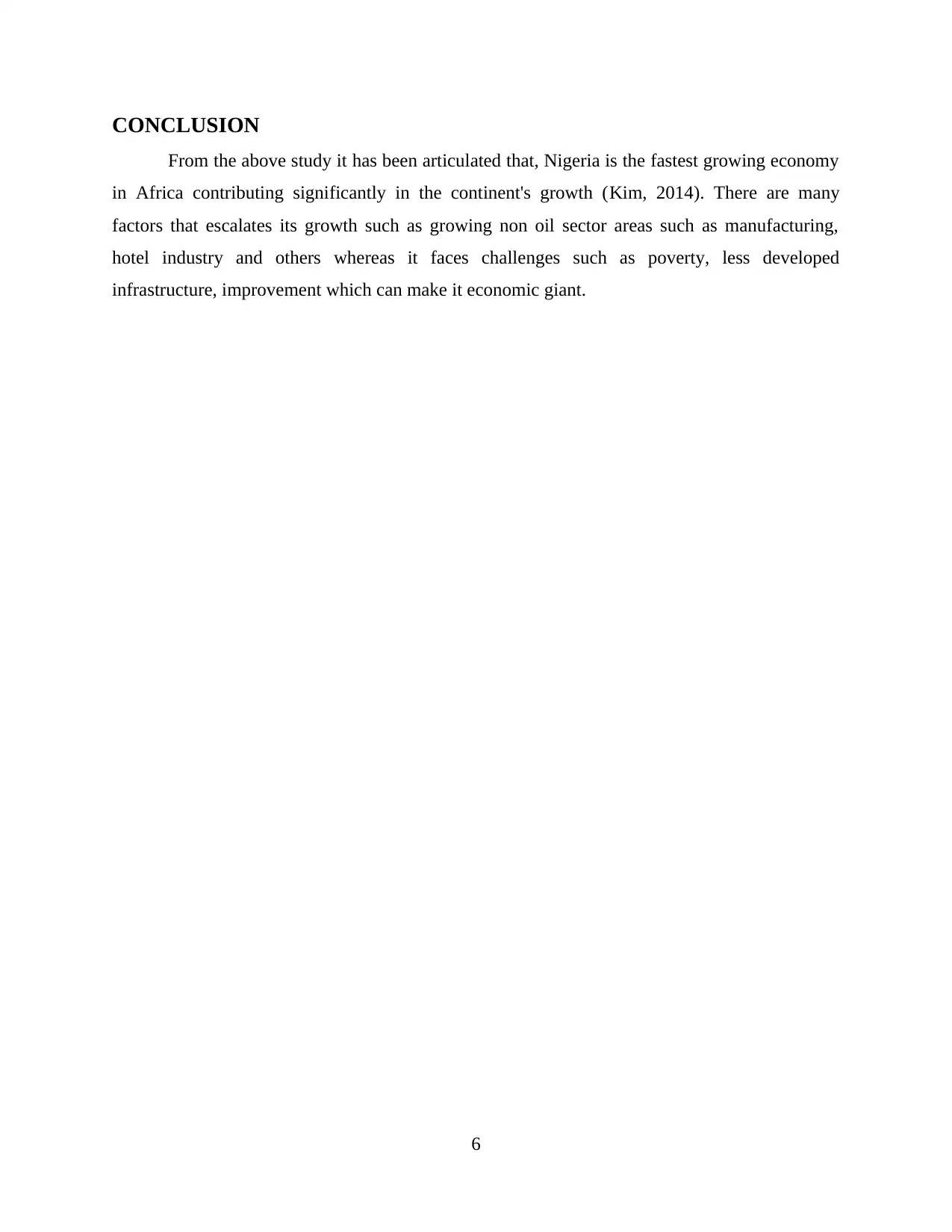
CONCLUSION
From the above study it has been articulated that, Nigeria is the fastest growing economy
in Africa contributing significantly in the continent's growth (Kim, 2014). There are many
factors that escalates its growth such as growing non oil sector areas such as manufacturing,
hotel industry and others whereas it faces challenges such as poverty, less developed
infrastructure, improvement which can make it economic giant.
6
From the above study it has been articulated that, Nigeria is the fastest growing economy
in Africa contributing significantly in the continent's growth (Kim, 2014). There are many
factors that escalates its growth such as growing non oil sector areas such as manufacturing,
hotel industry and others whereas it faces challenges such as poverty, less developed
infrastructure, improvement which can make it economic giant.
6
⊘ This is a preview!⊘
Do you want full access?
Subscribe today to unlock all pages.

Trusted by 1+ million students worldwide
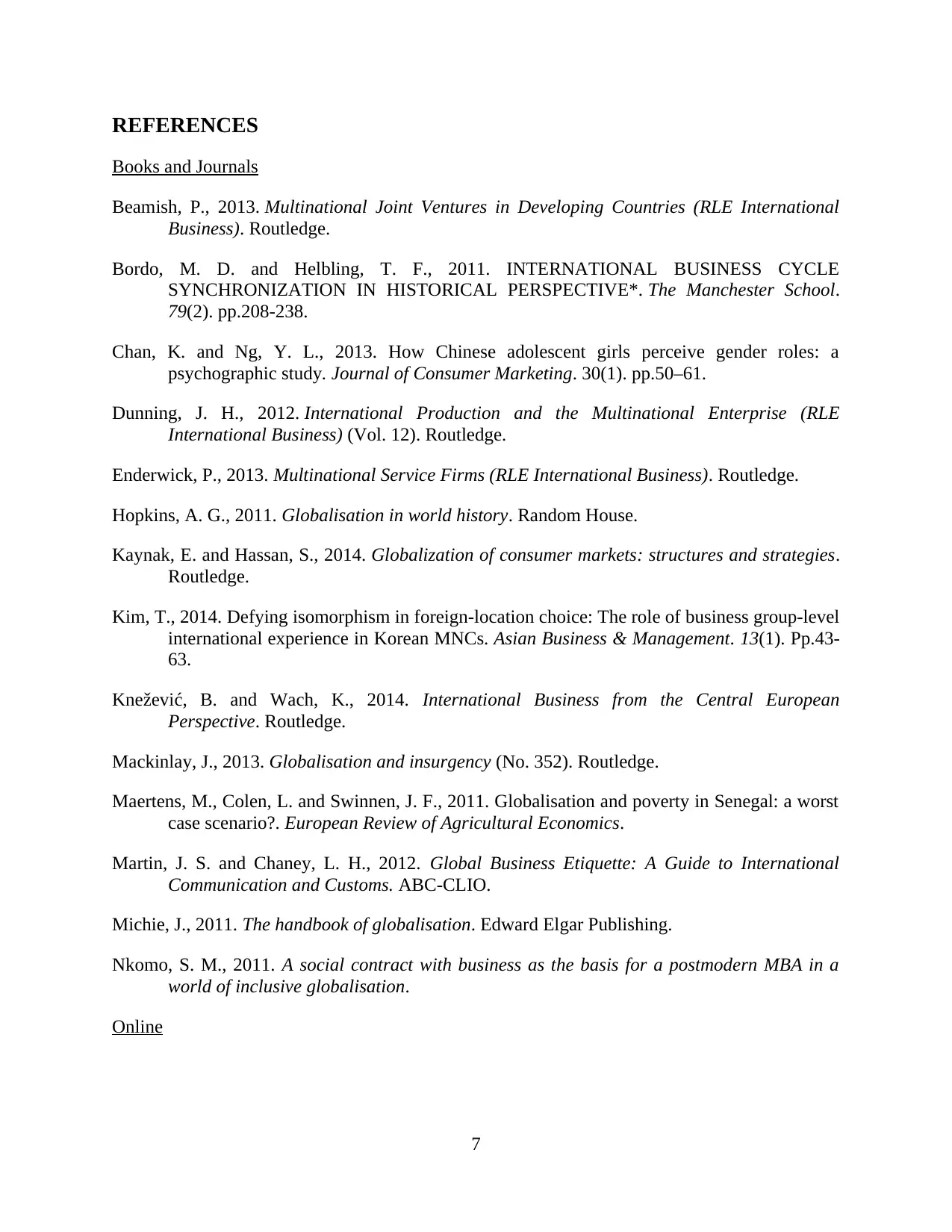
REFERENCES
Books and Journals
Beamish, P., 2013. Multinational Joint Ventures in Developing Countries (RLE International
Business). Routledge.
Bordo, M. D. and Helbling, T. F., 2011. INTERNATIONAL BUSINESS CYCLE
SYNCHRONIZATION IN HISTORICAL PERSPECTIVE*. The Manchester School.
79(2). pp.208-238.
Chan, K. and Ng, Y. L., 2013. How Chinese adolescent girls perceive gender roles: a
psychographic study. Journal of Consumer Marketing. 30(1). pp.50–61.
Dunning, J. H., 2012. International Production and the Multinational Enterprise (RLE
International Business) (Vol. 12). Routledge.
Enderwick, P., 2013. Multinational Service Firms (RLE International Business). Routledge.
Hopkins, A. G., 2011. Globalisation in world history. Random House.
Kaynak, E. and Hassan, S., 2014. Globalization of consumer markets: structures and strategies.
Routledge.
Kim, T., 2014. Defying isomorphism in foreign-location choice: The role of business group-level
international experience in Korean MNCs. Asian Business & Management. 13(1). Pp.43-
63.
Knežević, B. and Wach, K., 2014. International Business from the Central European
Perspective. Routledge.
Mackinlay, J., 2013. Globalisation and insurgency (No. 352). Routledge.
Maertens, M., Colen, L. and Swinnen, J. F., 2011. Globalisation and poverty in Senegal: a worst
case scenario?. European Review of Agricultural Economics.
Martin, J. S. and Chaney, L. H., 2012. Global Business Etiquette: A Guide to International
Communication and Customs. ABC-CLIO.
Michie, J., 2011. The handbook of globalisation. Edward Elgar Publishing.
Nkomo, S. M., 2011. A social contract with business as the basis for a postmodern MBA in a
world of inclusive globalisation.
Online
7
Books and Journals
Beamish, P., 2013. Multinational Joint Ventures in Developing Countries (RLE International
Business). Routledge.
Bordo, M. D. and Helbling, T. F., 2011. INTERNATIONAL BUSINESS CYCLE
SYNCHRONIZATION IN HISTORICAL PERSPECTIVE*. The Manchester School.
79(2). pp.208-238.
Chan, K. and Ng, Y. L., 2013. How Chinese adolescent girls perceive gender roles: a
psychographic study. Journal of Consumer Marketing. 30(1). pp.50–61.
Dunning, J. H., 2012. International Production and the Multinational Enterprise (RLE
International Business) (Vol. 12). Routledge.
Enderwick, P., 2013. Multinational Service Firms (RLE International Business). Routledge.
Hopkins, A. G., 2011. Globalisation in world history. Random House.
Kaynak, E. and Hassan, S., 2014. Globalization of consumer markets: structures and strategies.
Routledge.
Kim, T., 2014. Defying isomorphism in foreign-location choice: The role of business group-level
international experience in Korean MNCs. Asian Business & Management. 13(1). Pp.43-
63.
Knežević, B. and Wach, K., 2014. International Business from the Central European
Perspective. Routledge.
Mackinlay, J., 2013. Globalisation and insurgency (No. 352). Routledge.
Maertens, M., Colen, L. and Swinnen, J. F., 2011. Globalisation and poverty in Senegal: a worst
case scenario?. European Review of Agricultural Economics.
Martin, J. S. and Chaney, L. H., 2012. Global Business Etiquette: A Guide to International
Communication and Customs. ABC-CLIO.
Michie, J., 2011. The handbook of globalisation. Edward Elgar Publishing.
Nkomo, S. M., 2011. A social contract with business as the basis for a postmodern MBA in a
world of inclusive globalisation.
Online
7
Paraphrase This Document
Need a fresh take? Get an instant paraphrase of this document with our AI Paraphraser
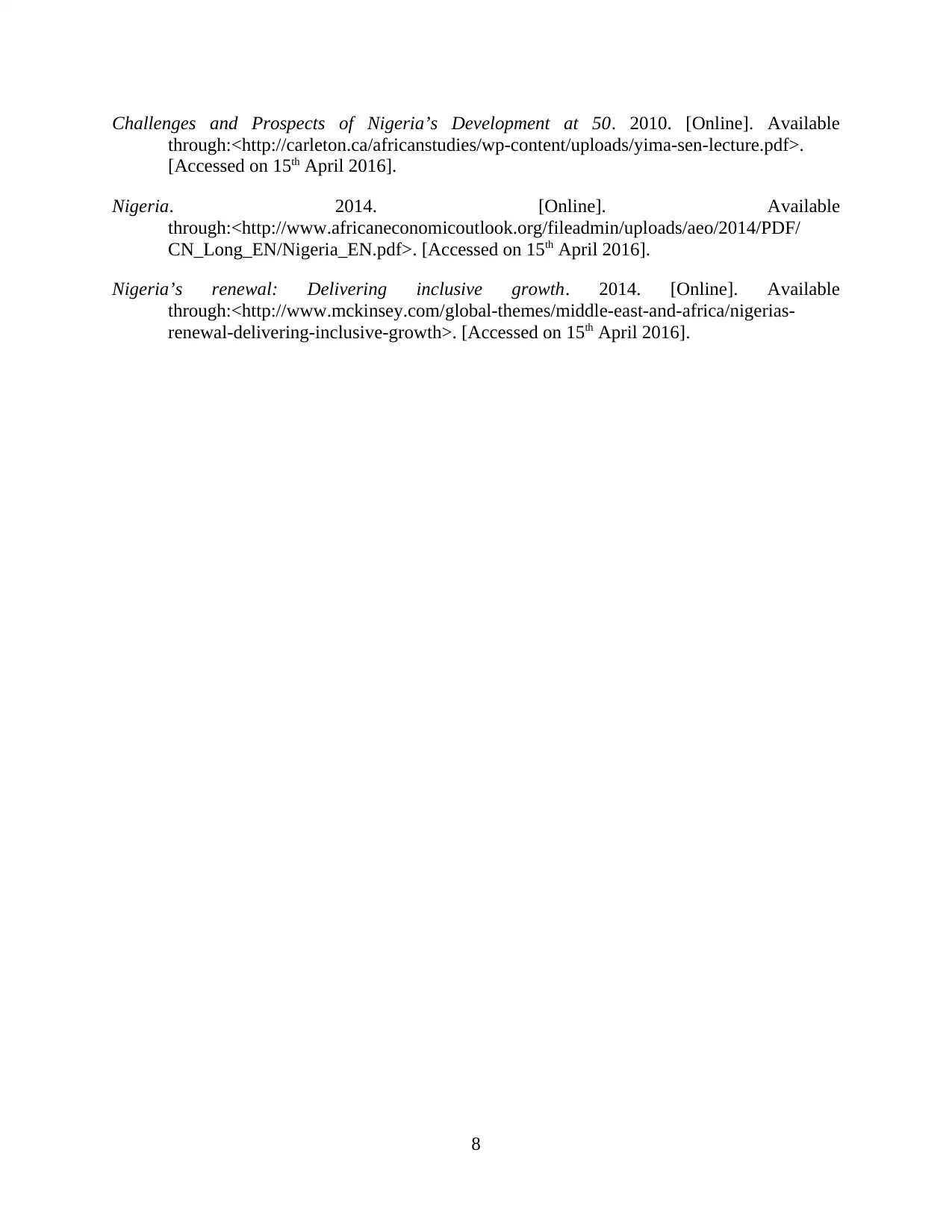
Challenges and Prospects of Nigeria’s Development at 50. 2010. [Online]. Available
through:<http://carleton.ca/africanstudies/wp-content/uploads/yima-sen-lecture.pdf>.
[Accessed on 15th April 2016].
Nigeria. 2014. [Online]. Available
through:<http://www.africaneconomicoutlook.org/fileadmin/uploads/aeo/2014/PDF/
CN_Long_EN/Nigeria_EN.pdf>. [Accessed on 15th April 2016].
Nigeria’s renewal: Delivering inclusive growth. 2014. [Online]. Available
through:<http://www.mckinsey.com/global-themes/middle-east-and-africa/nigerias-
renewal-delivering-inclusive-growth>. [Accessed on 15th April 2016].
8
through:<http://carleton.ca/africanstudies/wp-content/uploads/yima-sen-lecture.pdf>.
[Accessed on 15th April 2016].
Nigeria. 2014. [Online]. Available
through:<http://www.africaneconomicoutlook.org/fileadmin/uploads/aeo/2014/PDF/
CN_Long_EN/Nigeria_EN.pdf>. [Accessed on 15th April 2016].
Nigeria’s renewal: Delivering inclusive growth. 2014. [Online]. Available
through:<http://www.mckinsey.com/global-themes/middle-east-and-africa/nigerias-
renewal-delivering-inclusive-growth>. [Accessed on 15th April 2016].
8
1 out of 11
Related Documents
Your All-in-One AI-Powered Toolkit for Academic Success.
+13062052269
info@desklib.com
Available 24*7 on WhatsApp / Email
![[object Object]](/_next/static/media/star-bottom.7253800d.svg)
Unlock your academic potential
Copyright © 2020–2026 A2Z Services. All Rights Reserved. Developed and managed by ZUCOL.





